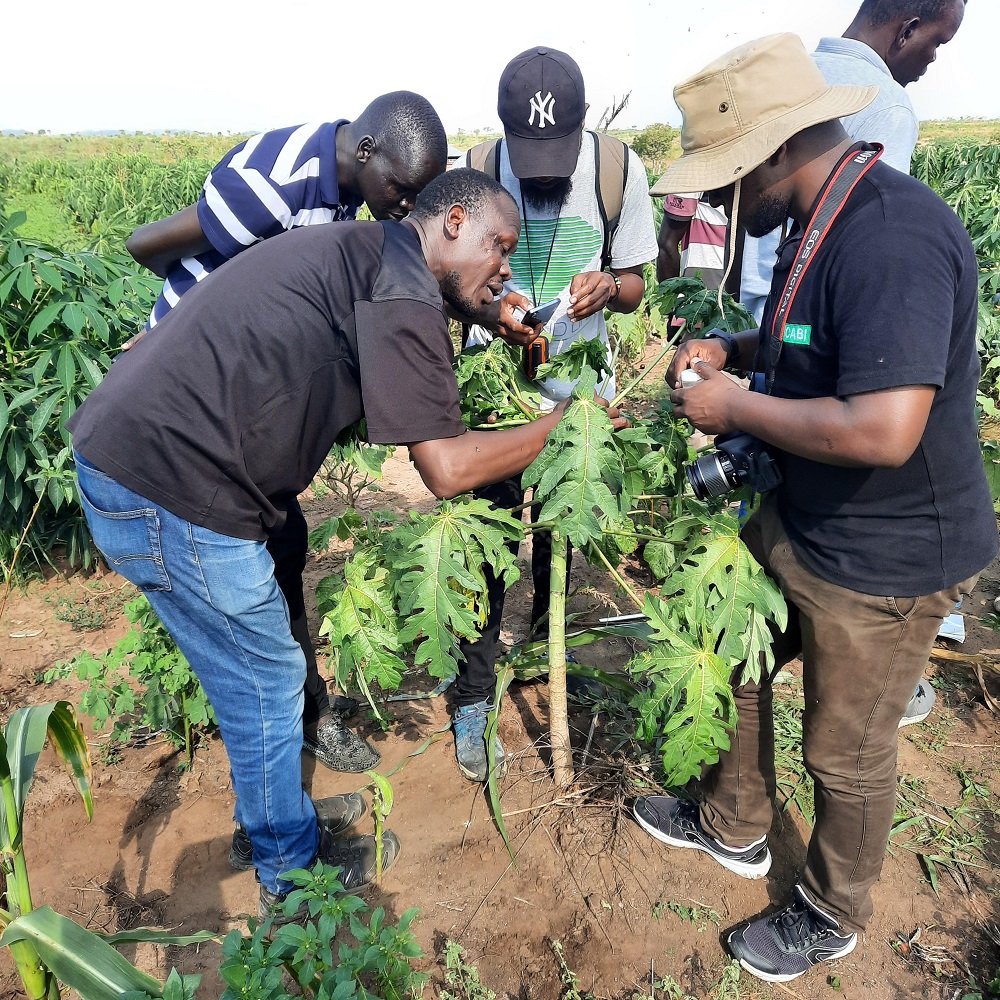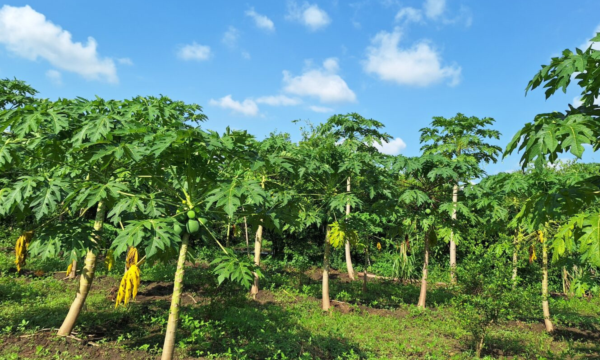
The papaya mealybug (Paracoccus marginatus) is a significant pest of papaya which has been wreaking havoc amongst smallholder farmers since it first invaded East Africa between 2015 to 2020.
At worst, the papaya mealybug causes up to 91% yield losses – worth around £2,224/ha to households – thereby severely impacting the livelihoods of smallholder farmers as well as local and national food security and opportunities for export.
However, CABI is working in partnership with national institutions to help farmers in South Sudan, Kenya, and Uganda, fight back with the prospect of introducing a natural enemy – the biological control agent Acerophagus papayae – to tackle the papaya mealybug.
This is to offer smallholder farmers an alternative to chemical pesticides, which are more harmful to use and more impactful upon the environment, to control the papaya mealybug pest by way of an Integrated Pest Management (IPM) plan.
Baseline survey to assess biodiversity
As part of the project ‘Biocontrol of papaya mealybug in East Africa,’ funded by the Darwin Initiative, CABI has turned its focus on infested fields at selected learning farms in the Central Equatoria region of South Sudan.
In partnership with the National Museums of Kenya and the University of Juba, South Sudan, CABI scientists Fernadis Makale and Harrison Rware, conducted a baseline survey to assess the native insect and plant biodiversity of the fields at the farms located in Nesitu, Ngorokoro and Rajaf.
This was to help understand the benefits of biological intervention and chemical use withdrawal at the selected biological learning sites.
Information gathered included papaya variety and tree number on the farm, sources of seed and market, papaya pest status, pest management practices, types of chemicals used and their targets, frequency of spraying, and the farm’s history of papaya farming.
The scientists used various methods to sample and assess the abundance and diversity of invertebrates which involved use of pan traps, pitfall traps, yellow sticky traps, and sweep nets.
Furthermore, a plant diversity assessment was carried out that looked at plant species grown in and around the farm – including hedges and intercrops that could be alternative hosts for the papaya mealybug as well as refuge sites for natural enemies and other beneficial insects.
Capacity building training delivered

As part of the same mission, capacity building training was delivered to 10 extension service providers in Central Equatoria. These included staff from the Ministry of Agriculture and Food Security (MoAFS) and the University of Juba
During the sessions, the participants received training on how to identify the papaya mealybug, biocontrol methods, the rearing of parasitoids, including in-situ production, and holistic management strategies under IPM.
Afterwards, the participants were asked about the likelihood of applying the knowledge they had gained where the majority indicated a medium extent of possibility. This suggests that they foresee a moderate likelihood of applying the newly acquired knowledge in practical situations.
This underscores the importance of further support and collaboration to bridge the gap between knowledge and application.
Why targeted interventions?

The scientists argue that efforts aimed at bolstering confidence, aligning the acquired knowledge with job requirements, and illustrating its potential positive impact on job performance, could enhance the likelihood of successful knowledge application within their professional contexts. It also emphasizes the importance of targeted interventions to maximize the utility of the acquired knowledge in their respective roles, they say.
Mr Makale said, “The feedback provided by the participants offers valuable insights into the training program focusing on papaya mealybug management and biological control strategies in South Sudan.
“Notably, participants emphasized the need to establish a dedicated laboratory for testing various pests and diseases, as well as a facility to support the mass rearing of parasitoids. Conservation efforts for natural enemies were also strongly advocated.
“While appreciating the training, participants also called for an enriched curriculum, incorporating comprehensive information about PMB and other pests affecting diverse plant varieties beyond the primary crop.
“Furthermore, a lack of confidence in applying the acquired knowledge underscored the necessity for practical training and field exercises.”
Recommendations for future improvement
Mr Rware added that recommendations for future improvement of capacity building training included extending the course duration, increasing practical training days, and organizing educational visits (technical benchmarking) to institutions like CABI.
“Understanding the role of natural enemies in farming ecosystems was emphasized, urging a heightened focus on papaya mealybug control and management through effective biological control methods. These suggestions collectively offer a roadmap for refining and enhancing future training initiatives,” he said.
Through the project, CABI and its partners – that also include the Kenya Plant Health Inspectorate Service (KEPHIS), National Agricultural Research Organization (NARO) and Kenya Agricultural and Livestock Research Organization (KALRO) – aim to improve the capacity of farmers and extension services to adopt climate-smart conservation.
This is by adopting biocontrol practices that interface with biodiversity conservation efforts and ultimately enhance food security.
Additional information
Main image: The papaya mealybug (Paracoccus marginatus) is a significant pest of papaya fruit which has been wreaking havoc amongst smallholder farmers since it first invaded East Africa between 2015 to 2020 (Credit: CABI).
Project page
Find out more from the project page ‘Biocontrol of papaya mealybug in East Africa.’
Relevant news
‘Fight against papaya mealybug in Kenya stepped up with agent release in four more counties.’
‘New research maps potential global spread of devastating papaya mealybug pest.’
Related News & Blogs
CABI-led study shows potential distribution of natural enemy for papaya mealybug pest across Africa
A new CABI-led study has shown the potential distribution of a natural enemy that is being used to fight the devastating papaya mealybug pest across East Africa. The scientists, who published their findings in the journal Biological Control, used a pre…
12 December 2024



